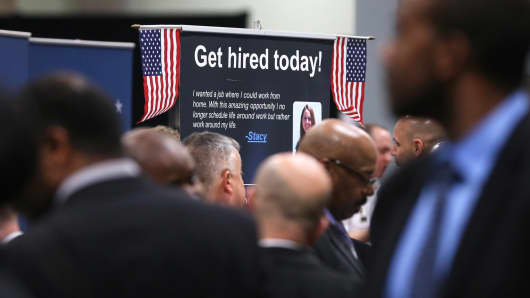Americans shouldn’t allow the headline low number from last Friday's unemployment rate, 4 percent, to lull them into a false sense of security. There is fundamental underlying jobs crisis looming. Millions of people are looking for work. Millions of people are underemployed or have stopped looking for work altogether. Rapid advances in technology are eliminating many jobs, altering others, and creating new ones that we never would have imagined 5, 10 or 20 years ago. As a result, all over this country, businesses are struggling to find the workers they need to fill a record 6.7 million open jobs.
There is a gap in what employers want and need from their workers, both now and in the future, and the skills Americans actually have. The gap is getting wider. The problem is getting bigger. The promise of sustainable, living-wage employment could evaporate for millions of hardworking Americans across the country if we don’t act now. The threat of massive structural unemployment is everyone’s problem. That’s why WorkingNation is working to expose hard truths about this looming unemployment crisis in the United States and bring the country together to create and amplify solutions.
It is not just factory workers and unskilled laborers facing the threat of unemployment; technology is dramatically changing highly skilled positions in white-collar industries as well. These are all good-paying jobs that need to be filled so that economies, businesses, and workers can thrive. This major challenge requires a widespread movement toward creating a workforce that is resilient, able to navigate the changing workplace, and adapt to the changing demands of modern employment. Overcoming the employability gap requires the active participation of employers, nonprofits, government leaders, and educational organizations on a grassroots, local level. Thankfully, some of these groups are already stepping up and offering innovative solutions.
3 partnerships that are creating jobs of the future
1. DowDuPont in Michigan
Take for example, DowDuPont. When Dow Chemical needed workers at its Midland, Michigan plants in 2008, it began a partnership with Delta College and Great Lakes Bay Michigan Works to train jobseekers in skills that exactly match those on the manufacturing floor. Each time, Dow needs to hire, it fires up the Fast Start program. The accelerated program — 13 weeks from start to finish — combines chemical lab work with classroom work and culminates in a job interview with the company. Over the past 10 years, Dow has hired 350 workers who went through the local skills training program to become full-time chemical process operators and technicians earning between $16 to $25 an hour plus benefits. Even with state unemployment down to 4.8 percent from its Great Recession high of 14 percent, Dow needs more workers and the program is helping fill that need.
2. Tesla and Google in Nevada
Nevada is another state seeing a resurgence from the economic downturn of 2008 and, by one estimate, there will be more than 600,000 new tech jobs in health care, manufacturing, and construction created over the next five years. In the northern part of the state where Tesla, Google, and Panasonic are expanding, those companies are working with a local community college to up-skill the local workforce. In Las Vegas, a registered apprenticeship program is helping close the skills gap in construction. Three times a week, 130 men and women gather in a classroom to learn to operate heavy equipment such as cranes or how to survey a site using drones and other cutting-edge tools. The other two days a week are spent on an actual union work site. At the end of the state-sanctioned construction apprenticeships, workers are being hired for jobs that start at $65,000 a year plus benefits.
3. J.P. Morgan, Bank of America and Wells Fargo in Los Angeles
Attrition is playing a role in the skills gap. More than 1.8 million specialists and clerks are expected to exit the financial industry over the next seven years as they get close to retirement. Combined with changes in technology, an estimated 4.5 million jobs will be vacant, creating a critical shortage. In Los Angeles, the JVS BankWork$ program is training jobseekers in underrepresented neighborhoods, preparing them for entry-level jobs in the industry. Bank of America, JP Morgan Chase, Union Banks and Wells Fargo are among the financial institutions funding the initiative. The intensive eight-week course is free, and newly-hired workers are offered an average of $16.95 an hour plus benefits for their first year.
Progress is being made locally. All of these programs show how collaboration within a community can change the economic course for everyone involved. Workers are getting the skills that make them attractive to local businesses. Businesses are developing the people they need to fill increasingly technical jobs. Wherever we see successful programs that are keeping Americans working, we see effective partnerships involving industry, education, government, and workers. This is the key. WorkingNation believes we need to expand the national conversation around the issue of unemployment caused by shifting technology.
— By Art Bilger, founder & CEO of WorkingNation









